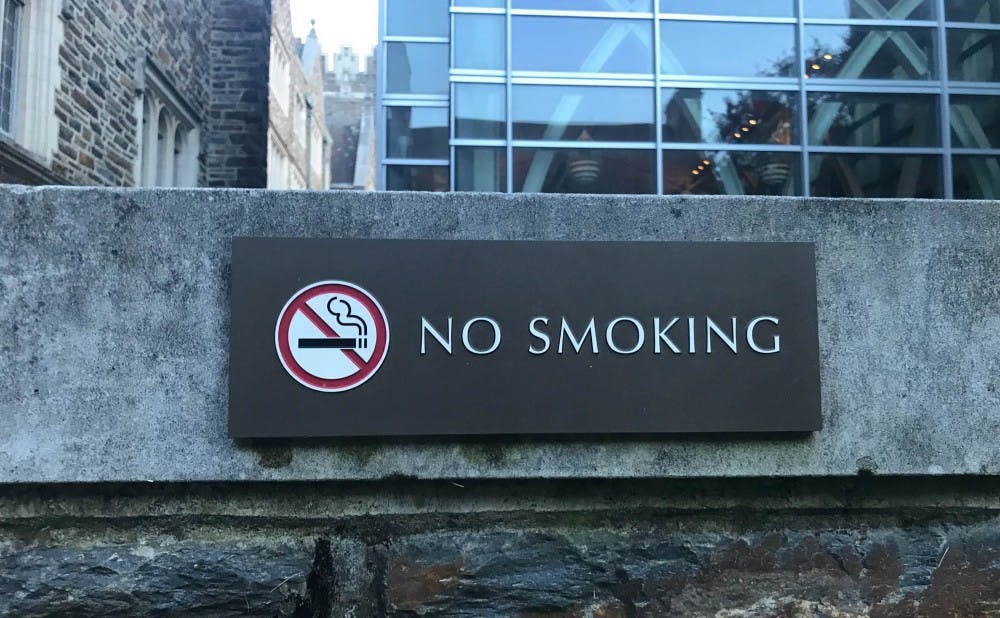Hate the smell of cigarette smoke? You’re in luck.
Duke’s tobacco-free policy went into effect Wednesday as part of an effort to create a more “healthy living and working environment” for the community, according to the Healthy Duke website. The policy prohibits “all tobacco-related products,” according to the website, from cigarettes to e-cigarettes and chewing tobacco, though nicotine replacements like patches and gum are allowed.
The ban was originally announced in April 2018 and was planned to prohibit only the use of combustible tobacco products such as cigarettes, cigars and hookahs. E-cigarettes and vaping products were added to the list in February 2020.
The policy applies to all students, staff, faculty, visitors, contractors and volunteers on any “property and grounds owned and leased by Duke University,” according to the Healthy Duke website. Any individual found using tobacco-based products will be “referred for tobacco cessation treatment,” the website states.
Some efforts to reduce tobacco use on campus have already been implemented. Duke Health instituted a tobacco-free policy in 2007, and Duke Stores discontinued cigarette sales on July 1, 2018.
The Duke Smoking Cessation Program partnered with Student Health and Employee Occupational Health & Wellness to provide assistance to those hoping to quit, offering individualized treatment plans ranging from phone counseling to prescribing medications, wrote James Davis, director of the program and associate professor of medicine—who led the tobacco-free policy initiative—in an email.
Benefit-eligible faculty and staff members can also receive discounts on nicotine replacement therapies, like gum and patches, or medications, including Chantix or Bupropion.
In 2017, the Duke Smoke Free Initiative and Duke Student Government members participated in efforts to create an anti-smoking policy, citing research suggesting that 67 percent of smokers will die of a smoking-related illness.
However, they hoped to continue to allow e-cigarettes and chewing tobacco on campus. Duke added e-cigarettes to the ban based on new evidence regarding health risks associated with them, including respiratory disease.
In an October 2019 letter to The Chronicle, eight Duke professors argued in favor of a ban on e-cigarettes. Four days later, a letter signed by 14 worldwide tobacco and addiction experts argued against a vaping ban.
Jed Rose, director of the Duke Center for Smoking Cessation and professor in psychiatry and behavioral sciences, pushed a pro-vaping stance before e-cigarettes were included in the ban, including as the top signatory of the letter arguing against a ban.
Rose has accepted research funding from the tobacco and e-cigarette industries, including Philip Morris International and JUUL Labs Inc. He said he has no conflict of interest issues.
Some students have criticized the ban on vaping for limiting the personal freedom of students or expressed doubt that their peers would comply with the policy once implemented, but others have commended Duke for taking a stand against tobacco use.
Correction: An earlier version of this article incorrectly stated that the Duke Center for Smoking Cessation worked to provide assistance to those hoping to quit smoking. It has been updated to reflect that the Duke Smoking Cessation Program did that work and to include information from James Davis, the program director and leader of the tobacco-free policy initiative. It has also been updated to reflect that Davis is an associate professor of medicine, not an assistant professor. The Chronicle regrets the errors.
Get The Chronicle straight to your inbox
Signup for our weekly newsletter. Cancel at any time.

Leah Boyd is a Pratt senior and a social chair of The Chronicle's 118th volume. She was previously editor-in-chief for Volume 117.

